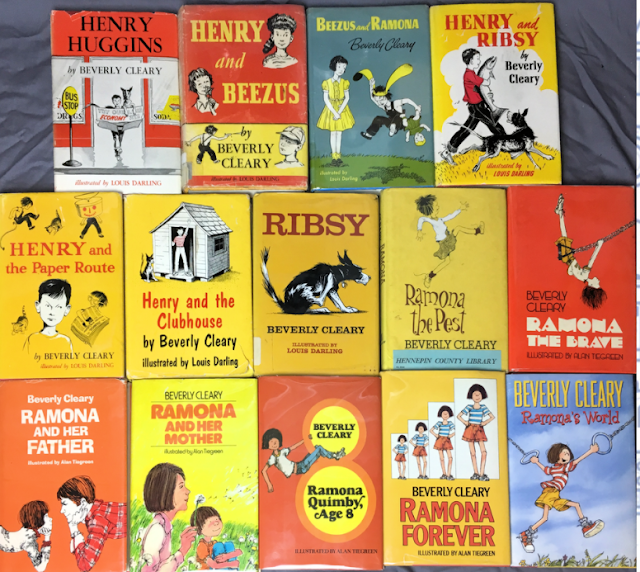beverly cleary, rest in peace, and thank you
Beverly Cleary, who died last week at the astounding age of 104, was a pivotal figure in the world of children's literature. Her books are treasures; her influence can scarcely be measured.
Cleary was one of the first authors to feature young characters who were realistically imperfect. If she was not the first, then certainly she was the first popular, widely-read writer who, as The Atlantic put it, "saw children as they are".
Before Henry Huggins and Ramona, before Otis and Ellen and Ralph S. Mouse, children's literature was preachy and moralistic. The sanitized characters bore little resemblance to actual children. Books typically stood above children, and spoke at them. Cleary's books stood beside children and reflected them.
Cleary's books were among the first that respected children -- their intelligence, their experiences. This would become the norm, of course, but it started somewhere, and that somewhere is Beverly Cleary.
From a tribute (not the obit) in The New York Times:
The much-adored author of 42 books for children, who was declared a "Living Legend" by the Library of Congress in 2000, died on Thursday at the age of 104.
To borrow a response from Cleary's most famous character, Ramona Quimby: "Guts! Guts! Guts!" What else is there to say?
Cleary's novels — "The Mouse and the Motorcycle," "Henry and Ribsy" and "Ralph S. Mouse," just to name a few — are now in the hands of a third generation of readers. Her books are a cornerstone of modern children's literature, front and center in the bedtime canon, and among the first that many young children enjoy on their own. She was the recipient of every accolade available to authors of books for young readers — from the Newbery Medal to the National Book Award — and will remain alive in the imagination of every child who met Ramona and Beezus Quimby, Henry Huggins, Otis Spofford, Ellen Tebbits or any one of her dear, flawed, funny characters, and thought: "That's me."
I also loved this context for Cleary's most popular character, Ramona.
One could argue that Ramona was the forerunner of what is now known as "girl power." Before Junie B. Jones and Ivy and Bean arrived on bookshelves, before words like "fierce" and "boss" migrated from zoos and office parks onto girls' T-shirts, she was strutting around with her hands on her hips, signing her name with a flourish — whiskers, pointy ears and a tail on the Q. No heart over the "i" for this girl.
"She was not a slowpoke grown-up," Cleary wrote in "Ramona and Her Mother". "She was a girl who could not wait. Life was so interesting she had to find out what happened next."
Right now I happen to be reading a biography of Louise Fitzhugh, who created the prototype of girl power for my generation, and many to follow. Harriet the Spy was published in 1964, Beezus and Ramona in 1955. I think Fitzhugh must have been influenced by Cleary... but I'll find out.
Many women cite Nancy Drew as a character that inspired them, and certainly series like the Nancy Drew and Hardy Boys mysteries gave children agency. But those characters are fantasies. Fantasies are useful and important, but they don't bring children recognition, a feeling of belonging, a comfort that they are not alone, that readers find from realistic depictions of lives and feelings.
Henry Huggins was the first book I ever read. Naturally I read it many, many times. As you may know, the story involves a boy who finds a lost dog, so skinny that its ribs are showing, hence the name Henry gives the pup.
Here's the part that is an indelible memory. The original owner shows up and insists the dog is his. He and Henry argue. They agree to let the dog decide, each person calling the dog, hoping the dog will choose him. The interloper uses the dog's original name, which of course Henry never knew. Unfair! Then Henry realizes he, too, can use the dog's old name... and Ribsy runs to him. Hurrah!
My family didn't have a dog yet, and I dreamed of finding a Ribsy and taking him home. Little did I know!
This 2011 interview with Cleary in The Atlantic is wonderful: "Beverly Cleary: 'I Just Wrote About Childhood as I Had Known It'".
The official Beverly Cleary website gives a great perspective on the characters she created.
Beverly Cleary, thank you, thank you, thank you!



Comments
Post a Comment